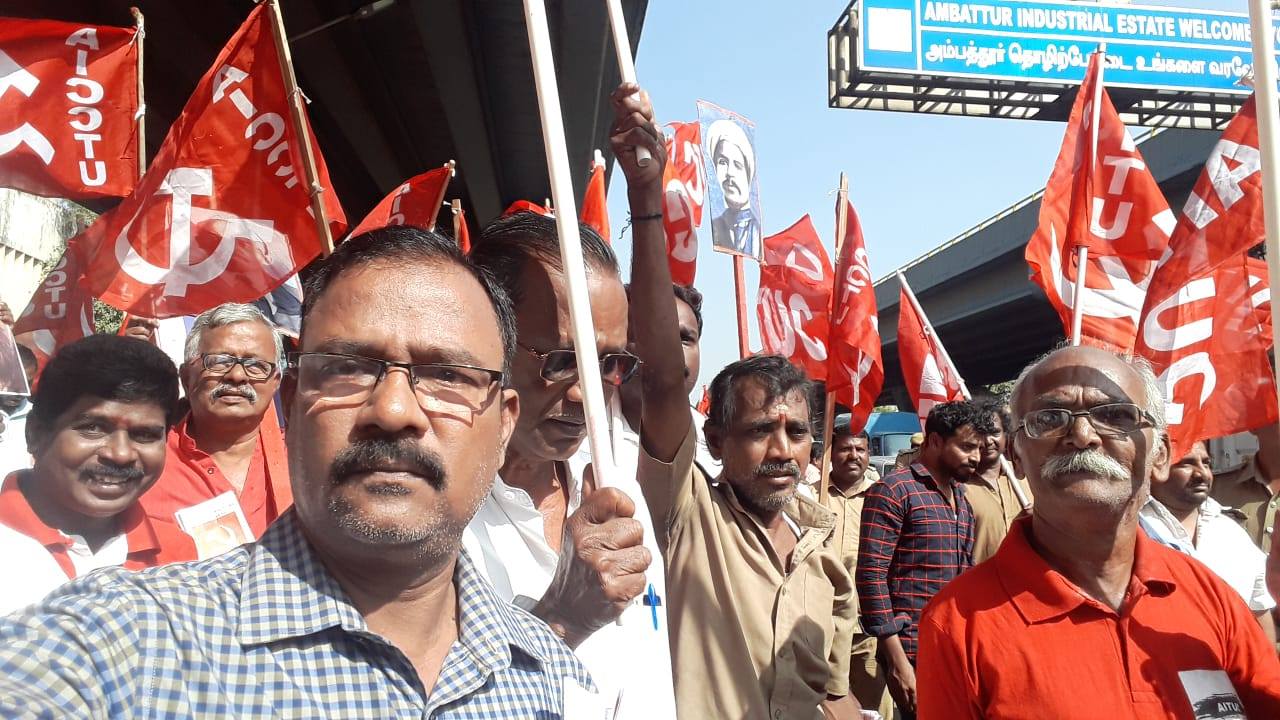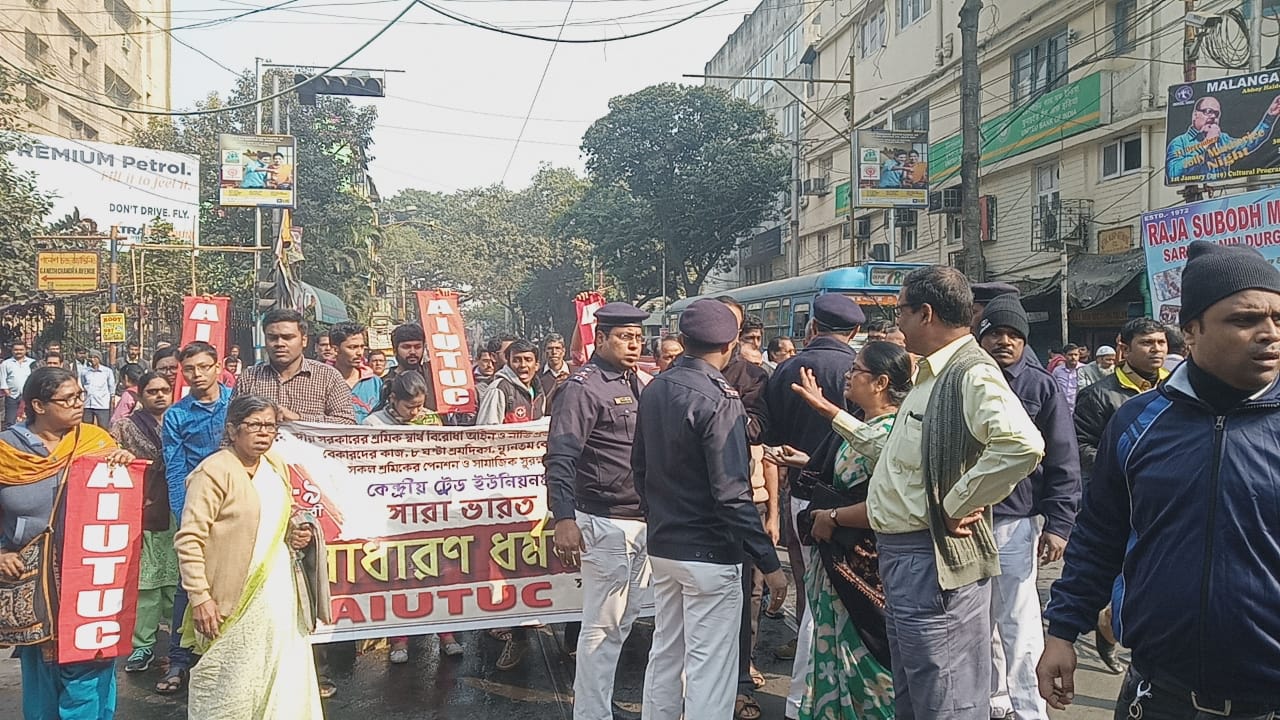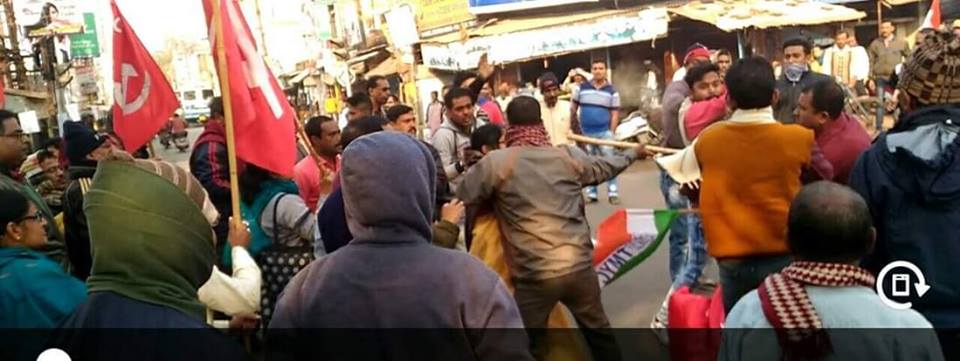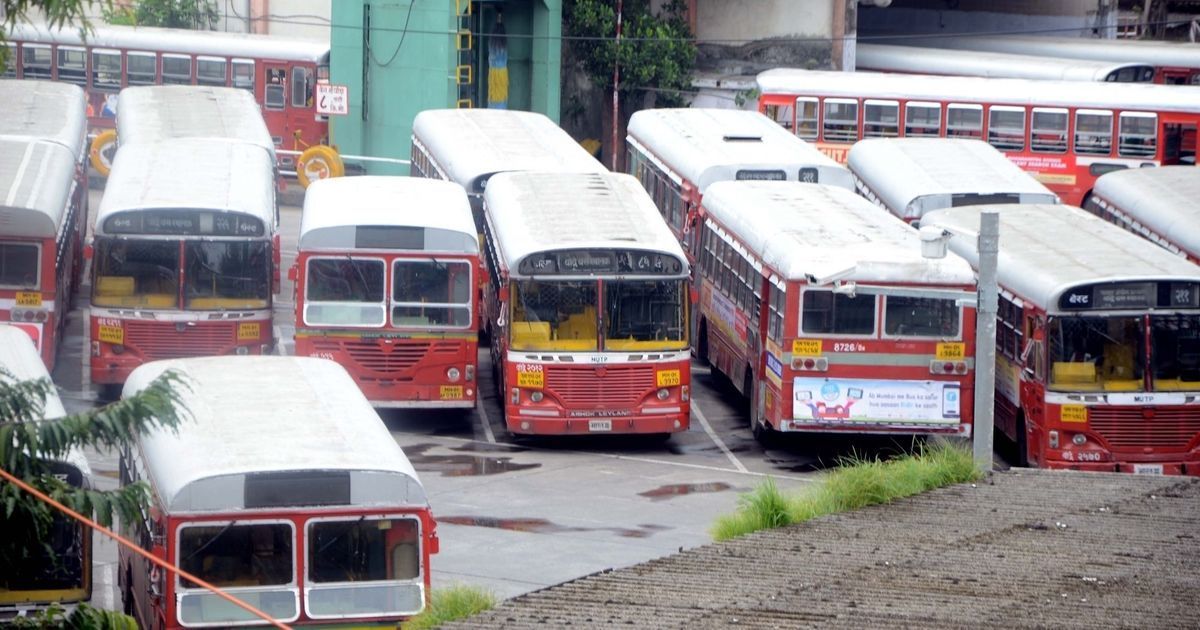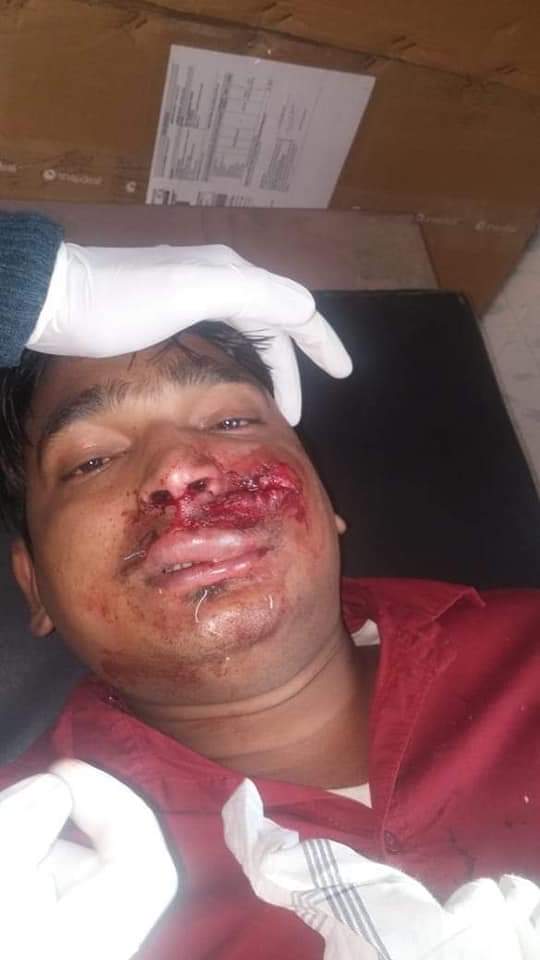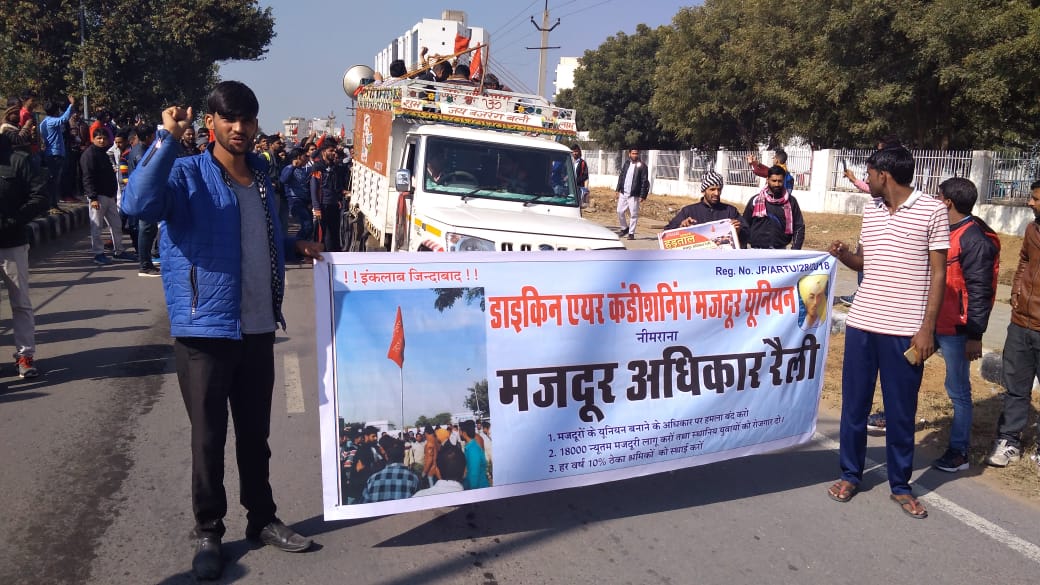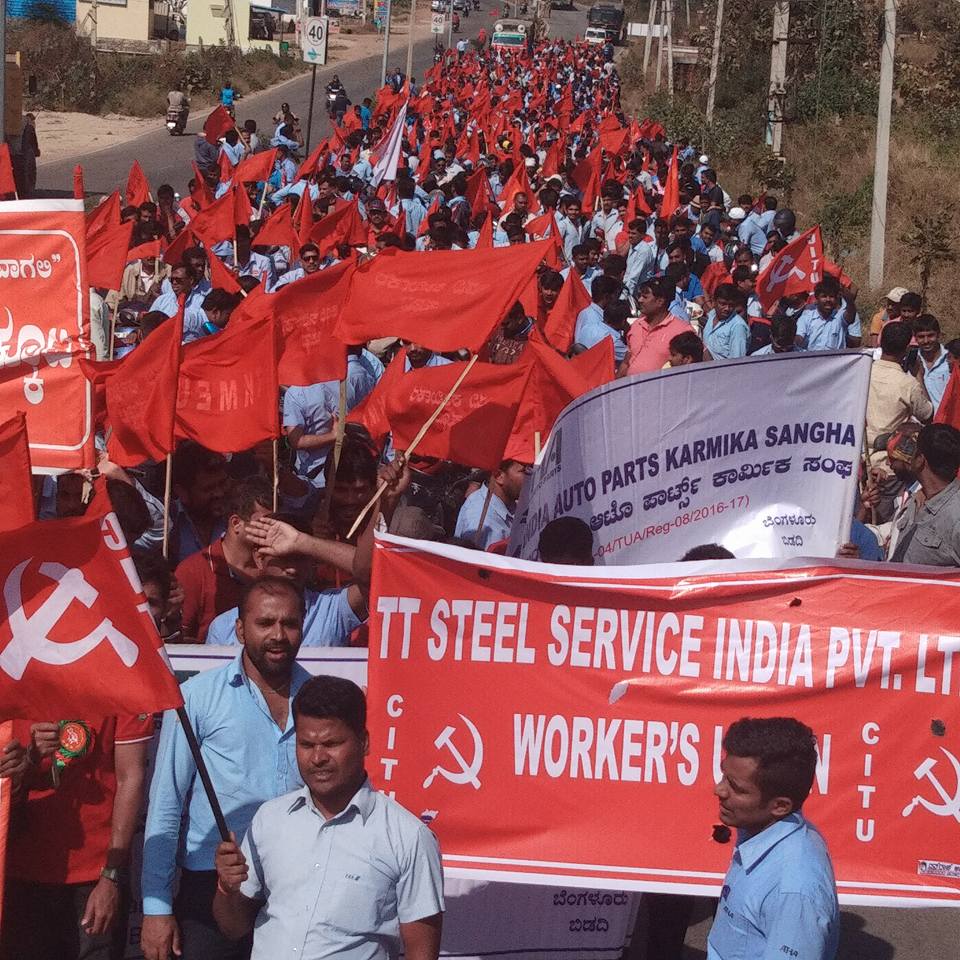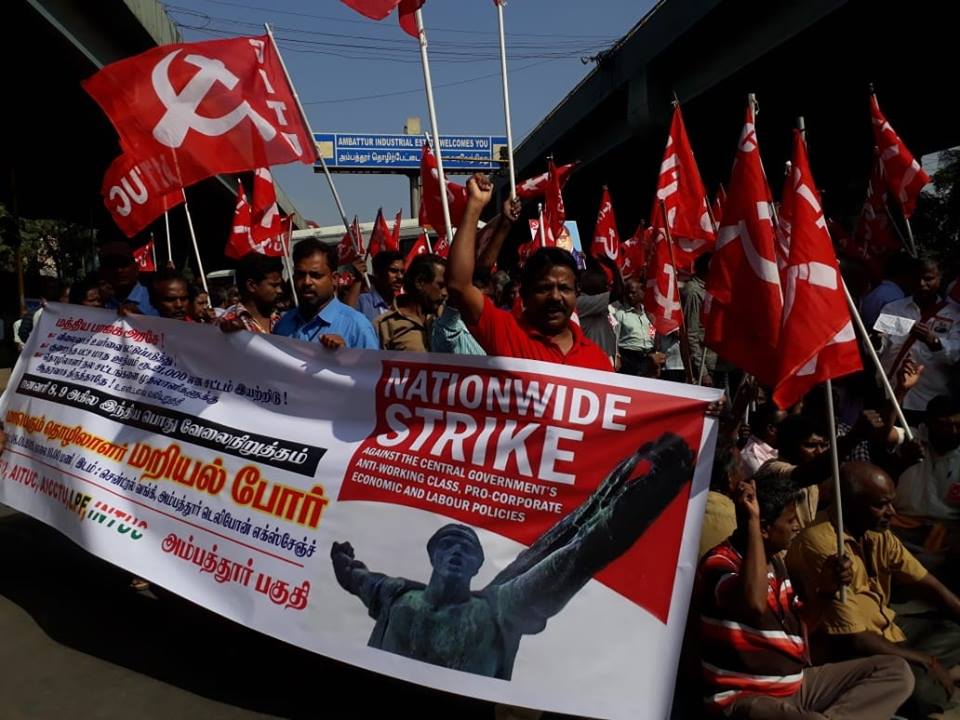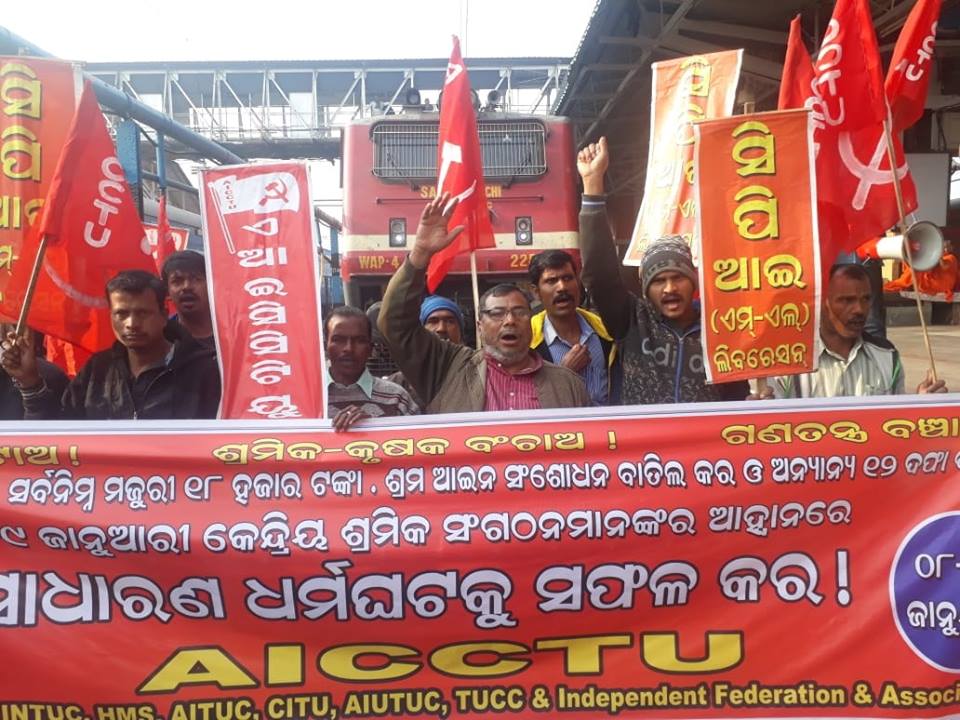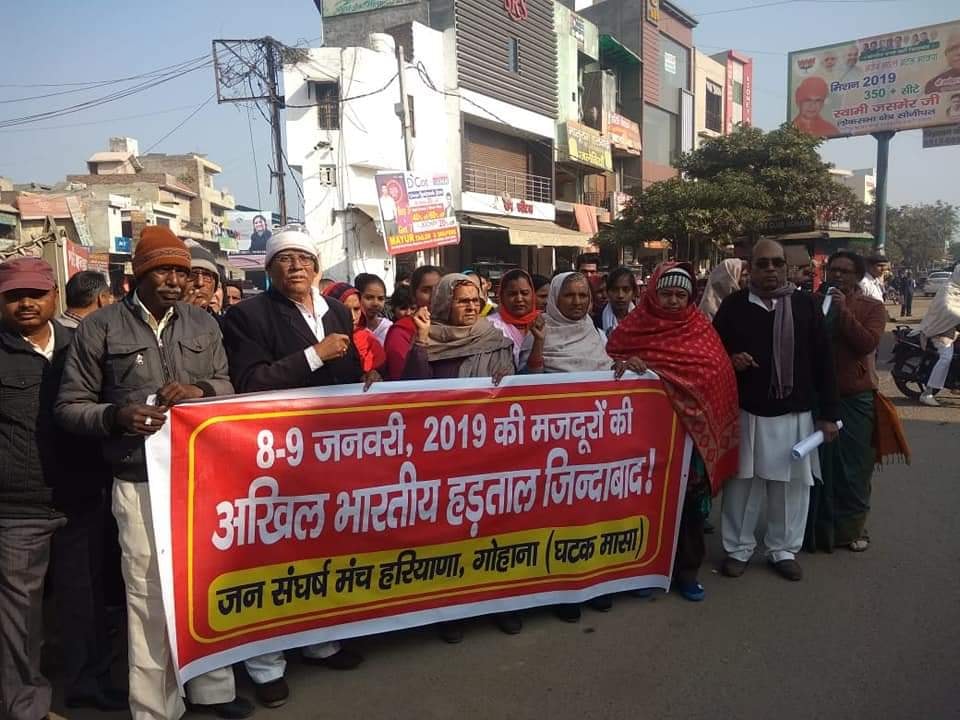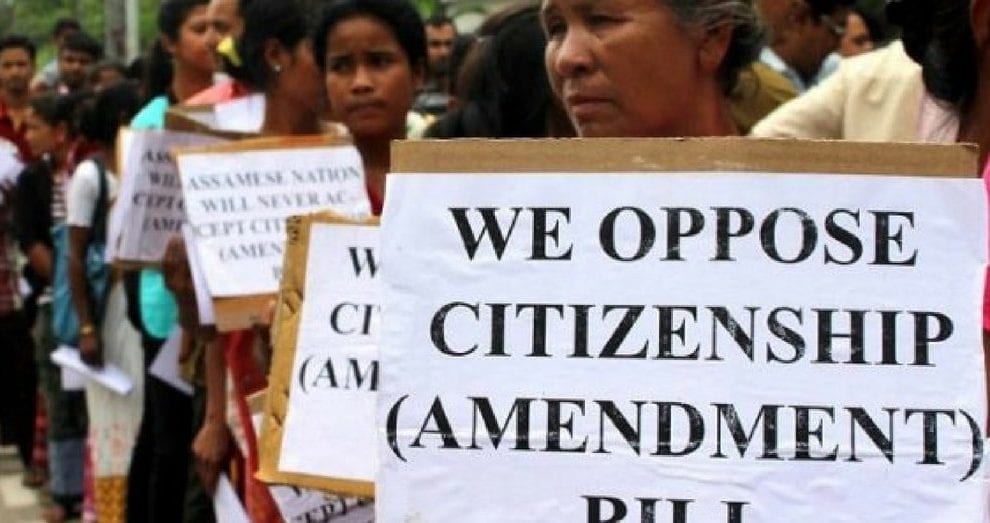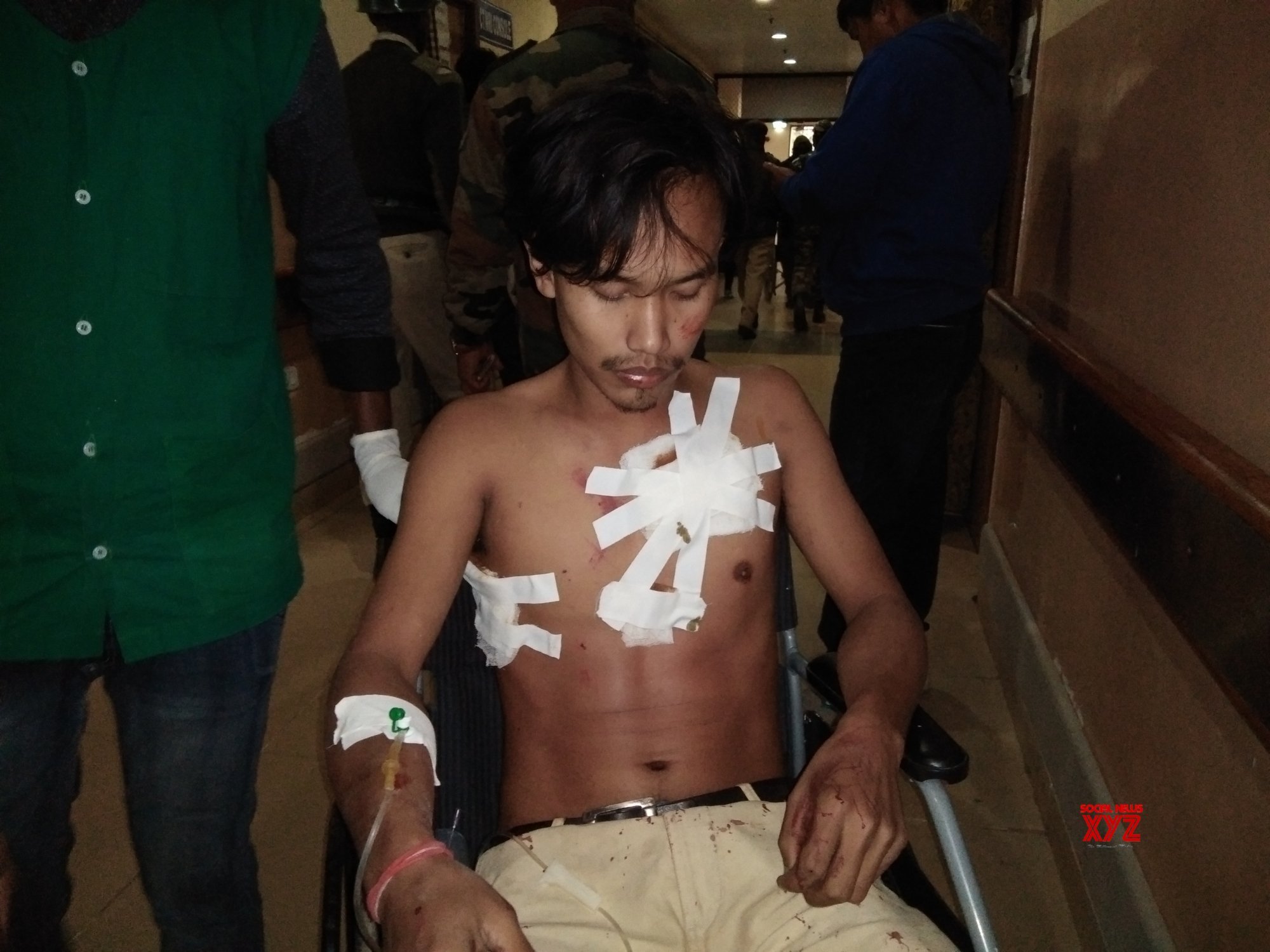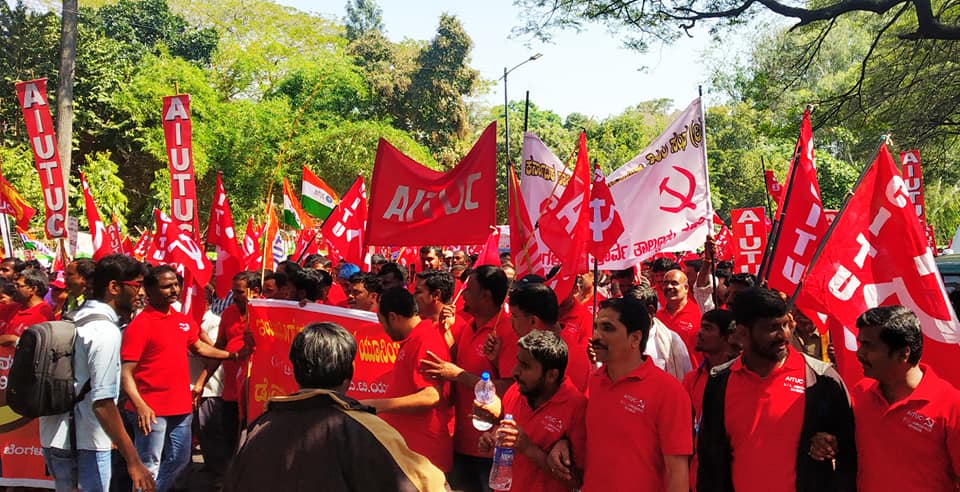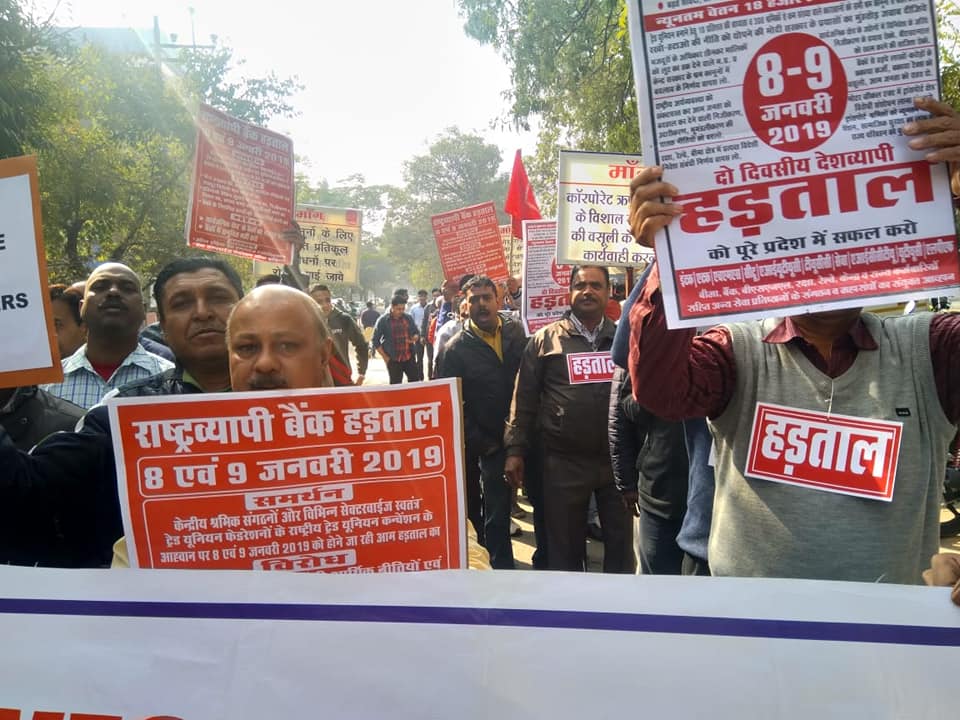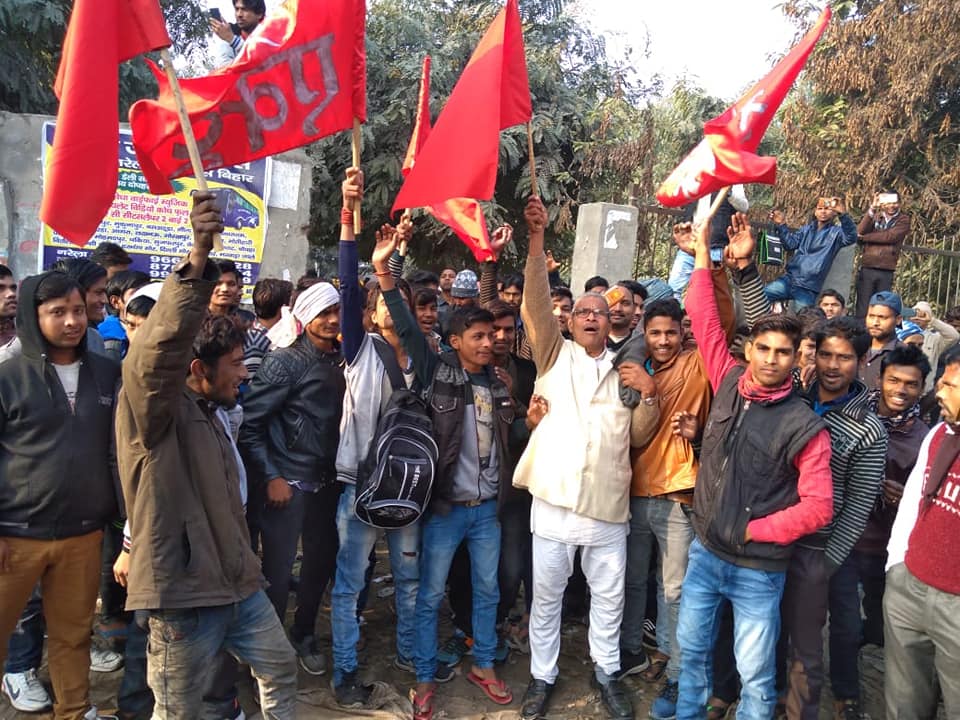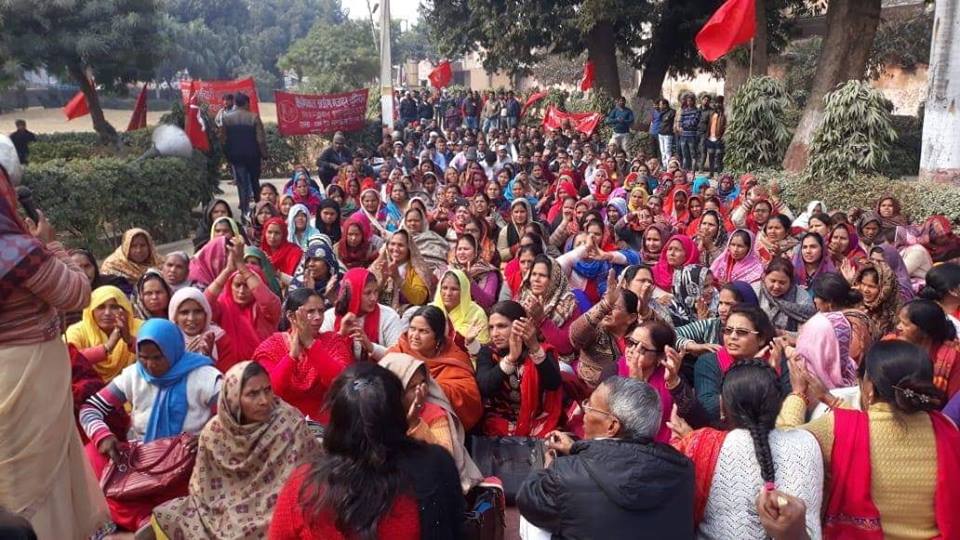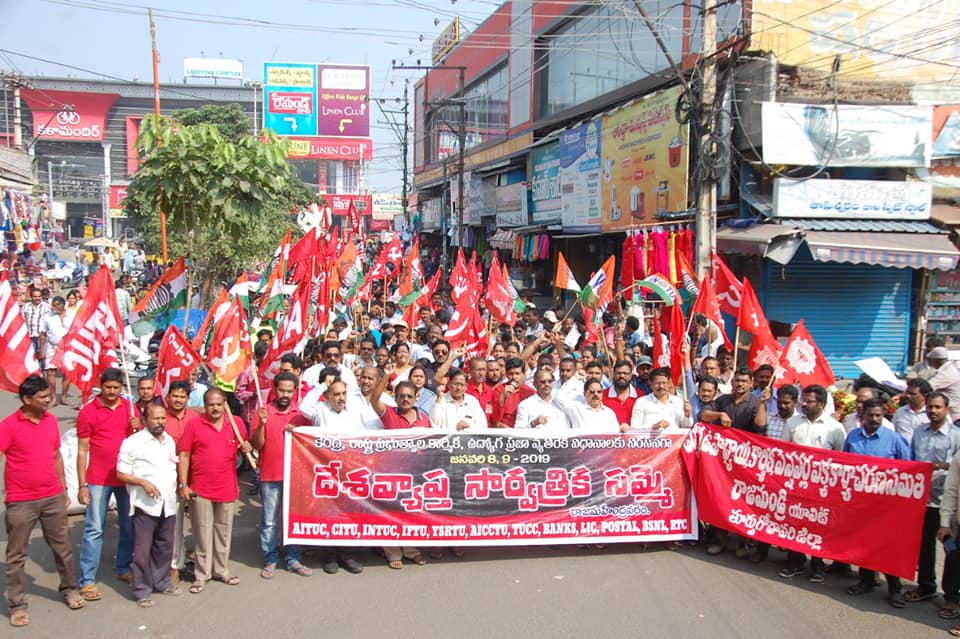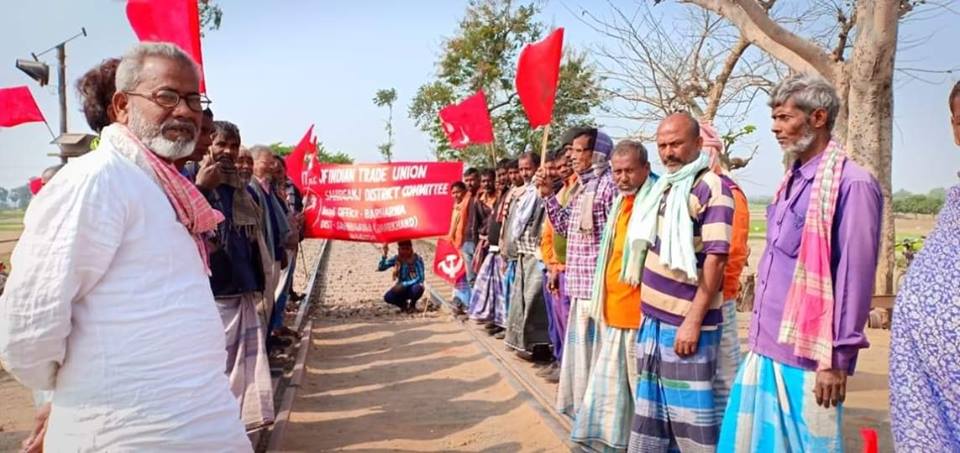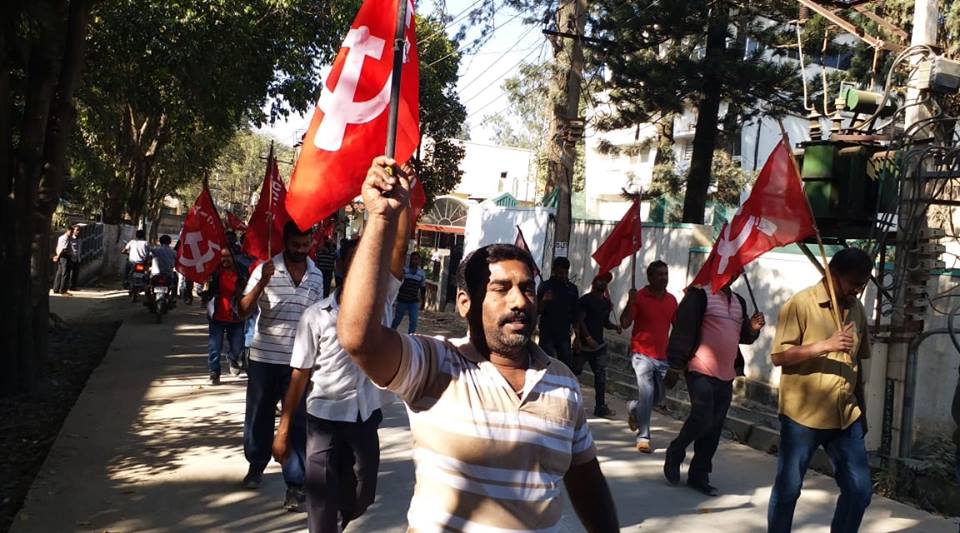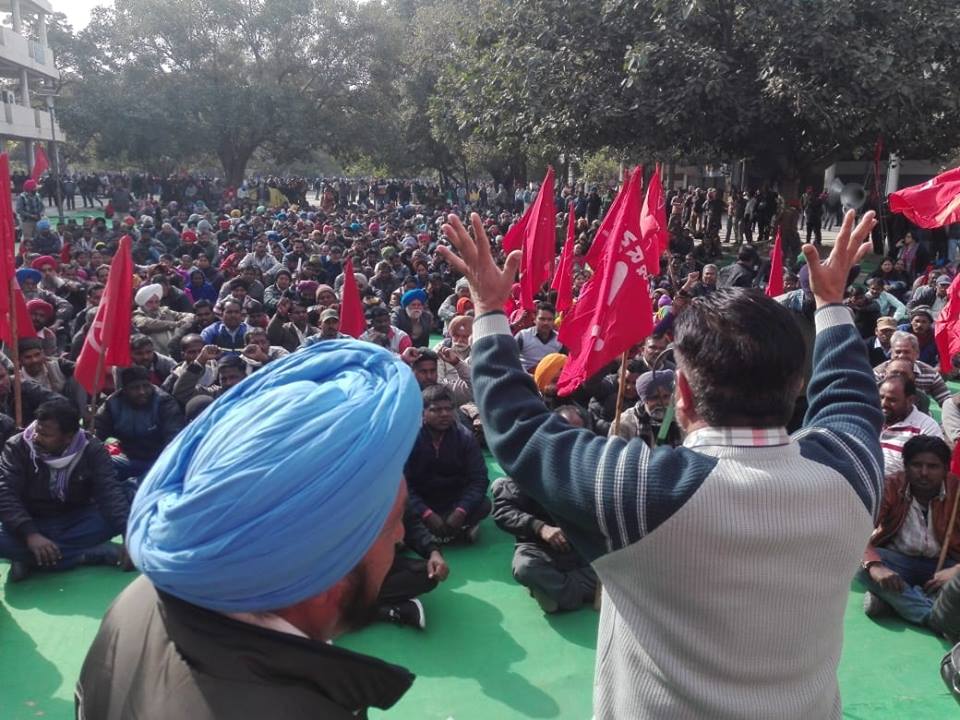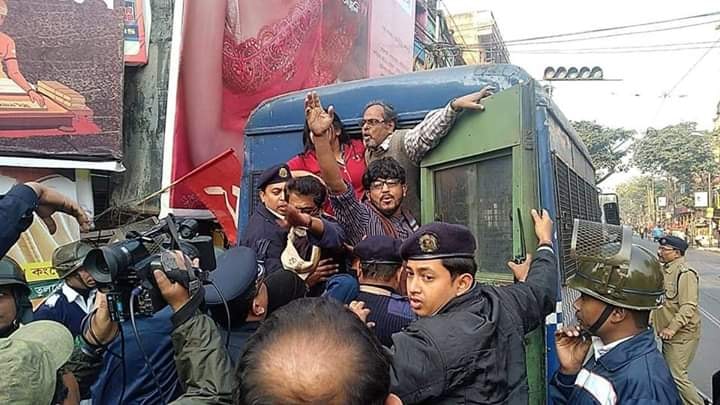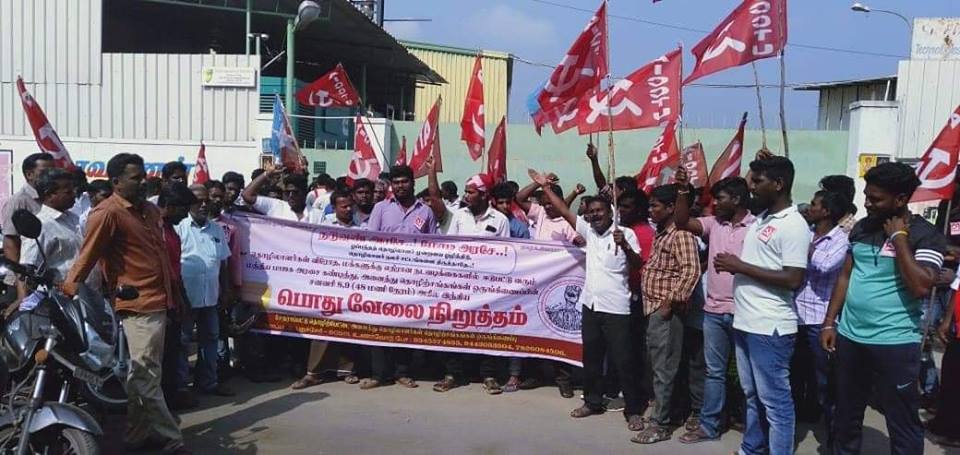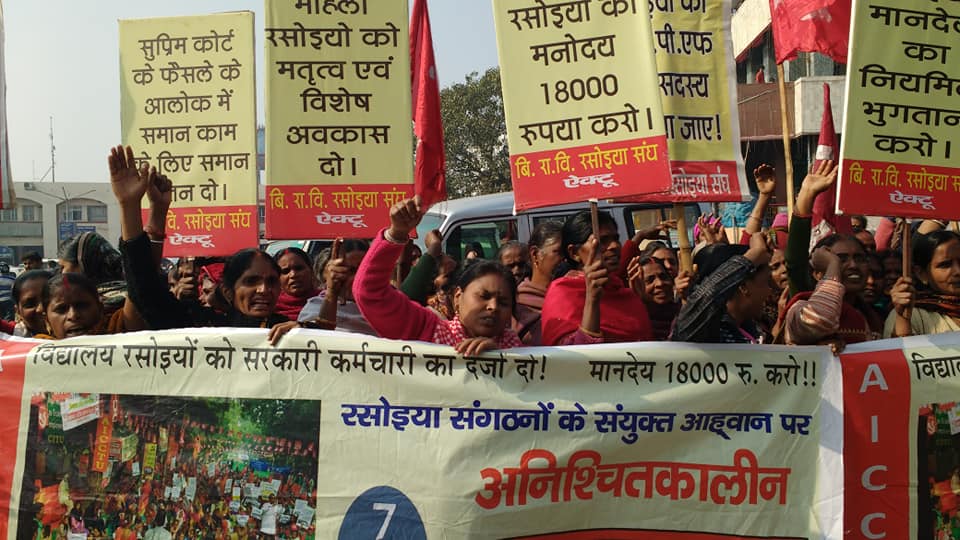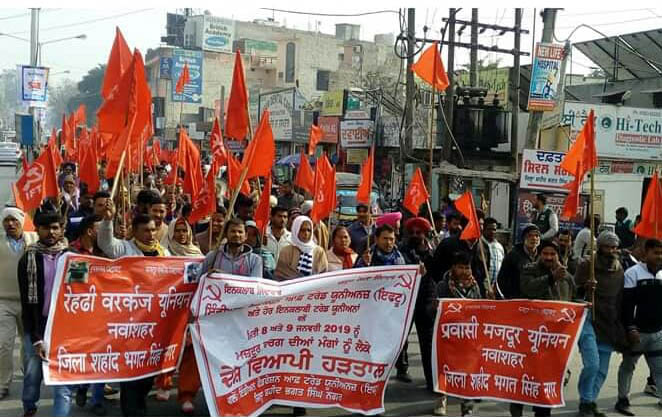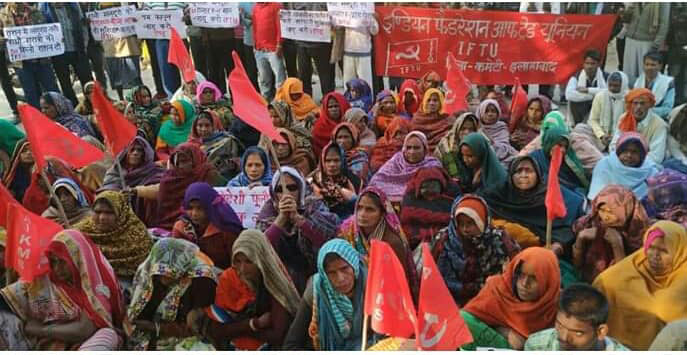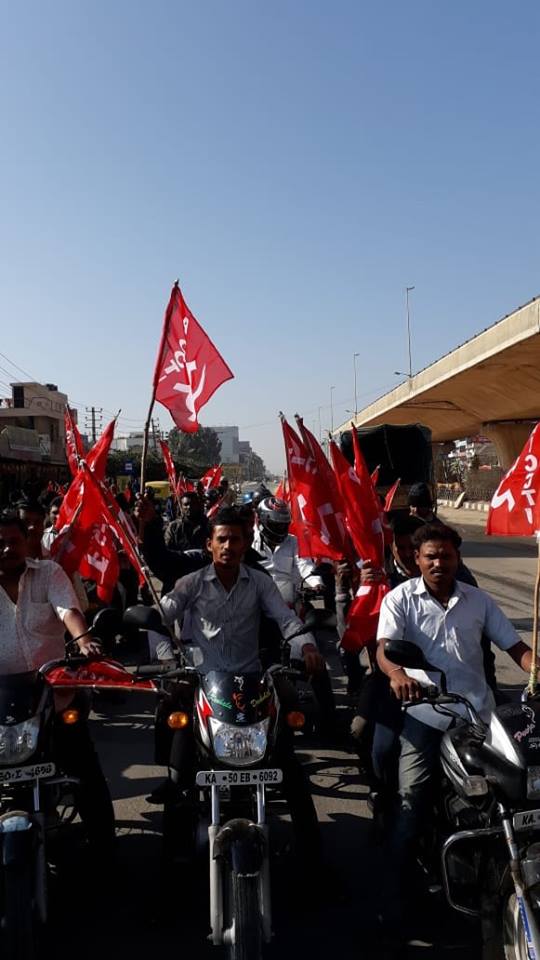The dissatisfaction among the working class, both in the organized and the informal sectors in India, against the pro-corporate policies of the successive Governments has continued to spiral up. The 2-day strike is demonstrative of escalating anger amongst working people. This is not a fit of rage against a specific government, but a reaction against the entire system of neoliberal capitalism. A Groundxero report.
The 2-day strike on 8-9 January 2019, called by a joint platform of 10 central trade unions, including the Indian National Trade Union Congress (INTUC), All India Trade Union Congress (AITUC), Hind Mazdoor Sabha (HMS), Centre of Indian Trade Unions (CITU), All India United Trade Union Centre (AIUTUC), Trade Union Coordination Committee (TUCC), Self Employed Women’s Association (SEWA), All India Central Council of Trade Unions (AICCTU), Labour Progressive Federation (LPF) and United Trade Union Congress (UTUC), evoked a mixed response.
The 12-point charter put forward by the joint platform of central trade unions demands the following:
- Urgent measures for containing price-rise through universalisation of public distribution system and banning speculative trade in commodity market
- Containing unemployment through concrete measures for employment generation
- Strict enforcement of all basic labour laws without any exception or exemption and stringent punitive measures for violation of labour laws.
- Universal social security coverage for all workers
- Minimum wages of not less than Rs 15,000/- per month with provisions of indexation
- Assured enhanced pension not less than Rs.3,000/- p.m. for the entire working population
- Stoppage of disinvestment in Central/State PSUs
- Stoppage of contractorisation in permanent perennial work and payment of same wage and benefits for contract workers as regular workers for same and similar work
- Removal of all ceilings on payment and eligibility of bonus, provident fund; increasing the quantum of gratuity.
- Compulsory registration of trade unions within a period of 45 days from the date of submitting application; and immediate ratification of ILO Conventions C 87 and C 98
- Stoppage of Pro Employer Labour Law Amendments
- Stoppage of FDI in Railways, Insurance and Defence
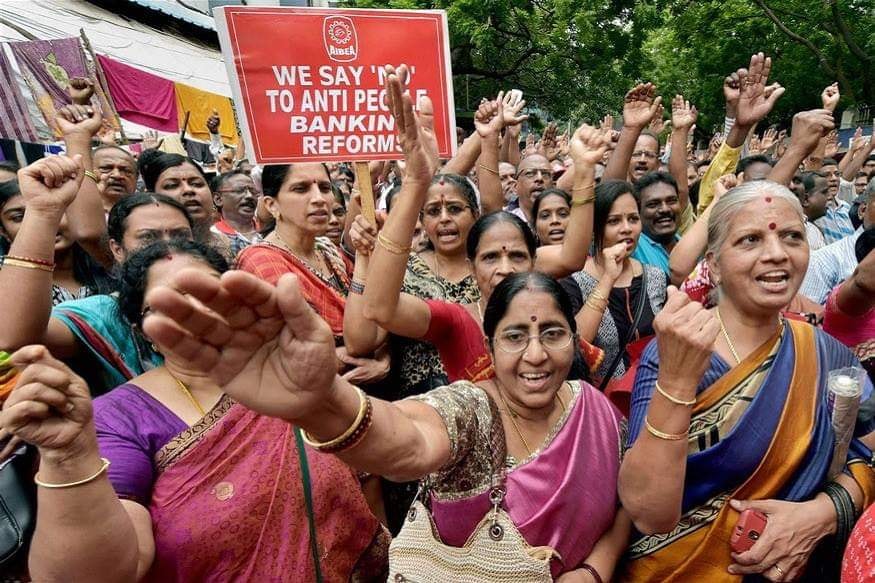
Members of The All India Bank Employees Association and Bank Employees Federation of India (BEFI) in support of strike
The strike had a significant impact in the states of Kerala, Odisha, Tamil Nadu, Bihar and Assam, while it was partially successful in Andhra Pradesh, Telangana, Jharkhand, and in several sectors across Punjab, Haryana, Uttar Pradesh, Rajasthan and Madhya Pradesh. Protest demonstrations were held and the strike observed in West Bengal, Delhi and in the industrial areas of Uttar Pradesh, Karnataka, Chhattisgarh, Puducherry, Goa and Maharashtra. In almost all major cities across the country, striking workers and employees held protest marches and public meetings. Many farmers’ organisations also joined in to express solidarity with the workers.
Various sectors – including banking, insurance, coal and non-coal mines, petroleum, post, telecom, engineering, manufacturing, steel, defence, and health –and workers including Anganwadi, ASHA and mid-day meal workers, central and state government employees, and auto-taxi unions actively participated in the nationwide strike.
Despite BMS, the largest trade union affiliated to RSS-BJP which actively worked to sabotage the strike, the first day of action was immensely successful. Nearly 20 million workers and employees participated in the strike.
A brief note on the first-day strike from across the country:
Partial strike in West Bengal
“In West Bengal, we have taken a stand of not supporting any bandh. Enough is enough. In the last 34 years, they (Left Front) have destroyed the state by calling bandh. There will be no bandh,” Mamata Banerjee told reporters at the state secretariat.
The state government has announced that its employees would be barred from availing casual leave or any half-day leave on Tuesday and Wednesday. No leave will also be allowed on the day preceding the two-day strike or following it, a government notification said last week.
But thousands of workers from West Bengal – from the industries, informal sectors and agrarian workers- took part in the strike, despite facing the brutal suppression of the Mamata Bannerjee-led Trinamool Congress (TMC) government.
Clashes between supporters of the ruling Trinamool Congress and opposition CPI(M) were reported from Sodepur, Asansol and Jamuria. The clashes reportedly broke out as CPI(M) workers tried to enforce the strike, after which TMC supporters confronted them. Clashes broke out between Trinamool Congress and CPI(M) workers in Bengal’s Asansol.
In North Bengal there was mixed response to the strike in the tea plantations. Across several gardens workers stopped work, and took out rallies demanding revision of minimum wages, generation of employment, reduction in commodity prices and raised slogans against the politics of religious fundamentalism.
In Dooars, one of the plantation owners’ associations themselves claimed that around 15% gardens have been affected by the strike. There were reports of managers themselves urging the workers to take leave at some of the gardens. Given that there is not much work at this time of the year, the management seemed fine with workers taking unpaid leave. “Of the 87 tea gardens in Darjeeling hills, 30 are closed. Most of the closed gardens are in Mirik valley,” said Saman Pathak, former Rajya Sabha MP from the CPI(M) and Darjeeling district chief of CITU. GJMM leader Binay Tamang, current leader of the Gorkhaland Territorial Administration, opposed the strike.
Siliguri town on the other hand saw an almost complete strike, according to reports. The famous Subhashpally market was totally shut down, which is rare. Shibmandir area was reported to have been mostly shut down. Empty state buses were seen plying. Rallies were taken out in the town through the day. In Alipurduar, 5 people were detained for the entire day. This included 3 AITUC activists and 2 CITU activists.
There are reports of police and TMC violence on strike supporters from various parts of the state. The police picked up many activists and produced them in court with rope tied to their waist and hands cuffed.
Strike successful in Mumbai
Banks, LIC, GIC, MS Electricity, Post and other Central Govt. Offices were completely paralised. A mamoth Rally was organised at Azad Maidan under the banner of Kamgar Sanghatna Joint Action Committee.
Over 33,000 employees of the Brihan Mumbai Electric Supply and Transport (BEST) – Mumbai’s public transport undertaking – went on a complete and indefinite strike from 8th January, demanding the merger of the officially loss-making BEST’s budget with the principal budget of the BMC, higher salaries and a new wage agreement that has been pending since April 2016. Each one of the 3,200 buses of the Transportation body stood still through the day.
“The BMC has done absolutely nothing in addressing the main reason why BEST is in crisis today: its own single-minded dedication to promote an energy guzzling, land intensive, polluting, and exclusive car-centric transport system,” said a press release from the Aamchi Mumbai Aamchi BEST (AMAB) – an independent forum of citizens for public transport, which came out in solidarity with the striking BEST employees.
The BEST administration has threatened to invoke the Maharashtra Essential Services Maintenance Act (MESMA) and take action against striking workers. BEST Kamgar Sena, the labour union of the Shiv Sena, has kept itself away from the strike, but has not opposed it.
Voilence in Neemrana, Rajasthan
In Nimrana, factory workers of Daikin Air conditioning India Pvt. Ltd. – established in the Japanese Zone area of Rajasthan (hosting all foreign multinational companies from Japan) – came together to hoist their union flag. Police brutally attacked workers at the factory gate. Lathicharge, water cannon, tear gas, firing of rubber bullets by police on strikers was reported. Number of workers were seriously injured and had to be hospitalized. But even with police and bouncers on company payroll and coercion on contract workers, they couldn’t stop the strike from happening.
All workers’ organizations have strongly condemned this attack and expressed solidarity with the Daikin workers.
In state capital Jaipur, workers striking in industrial areas gathered at Shaheed Memorial Government Hostel. Many organizations, including Central Trade Unions like CITU, INTUC, AITUC HMS as well as Bank, LIC, Central employees, railways and roadways employees’ unions participated in the strike.
Mixed response in Karnataka
While buses of the Karnataka State Road Transport Corporation (KSRTC) stayed off the roads in most parts of the state, holiday was declared in schools and colleges, with examinations being postponed. A 57-year-old woman collapsed and died during trade unions’ protest in Uttar Kannada’s Mundagodi on Tuesday, while nearly 5,000 bandh supporters blocked the Mumbai-Baroda-Jaipur-Delhi national highway in Maharashtra’s Palgh.
In Bidadi industrial area of Ramnagar district, Davangere and in various areas of Bangalore workers and others enforced strike against anti labour policies of Central Govt. Toyota Kirloskar Motor workers participates in all india general strike at Bengaluru.
Tamilnadu
Dire political and economic condition has forced workers to respond positively to the general strike. AICCTU has organized tannery workers, garment workers in Tirupur belt and other unorganized sector workers for the strike.
In CPCL refinery, near Chennai – workers participated in the strike for making them permanent, for implementing Rs18000 as minimum wage and against FTE and NEEM. Tasmac workers in Chennai also participates in the all India general strike.
Over 500 workers from CITU, AITUC, AICCTU and other unions, who went on a protest demonstration at Ambattur have been detained. They were participating in the All India General Strike. Workers from MRF and Ashok Leyland arrested when they came together to protest.
Total shutdown in Orissa
Different political parties in Odisha, including the ruling BJD and its trade union front Biju Sramika Samukhya, have extended support to the strike. Shops, markets, business establishments, educational institutions and offices remained closed in Odisha, while vehicular movement virtually came to a grinding halt across the state.
In Bhubaneswar, trade union activists staged picketing and road blockade by burning tyres at several places and busy thoroughfares. They held a sit-in at Master Canteen Square. In Cuttack, activists picketed and blocked roads at various places, besides staging a rail roko at the railway station.
Educational institutions, including schools, colleges and universities remained shut in view of the strike. In the port town of Paradip in Odisha, activists staged a demonstration near five gates of the port and blocked the road leading to the IOCL refinery at Rangiagarh.
Haryana :
In support of the All India strike of workers, Jan Sanghrash Manch Haryana (Constituent of Mazdoor Adhikar Sangharsh Abhiyan), held demonstration in Gohana, Haryana. Sit in demonstration was held in Baba Saheb Ambedker Square and General Bus Stand along with striking roadways employees.
Total shutdown in North East
In addition to the nationwide workers strike, political and student organizations organised a shutdown in the North East states on Tuesday in protest against the controversial Citizenship (Amendment) Bill 2016, which was to be introduced in the Loksabha on that day. The North East Students’ Organisation, an umbrella organisation of students’ unions, has called for a dawn to dusk strike. Apart from the political outfits in Assam, the Mizo Zirlai Pawal, the All Arunachal Pradesh Students’ Union, the Khasi Students Union, the Garo Students Union, the Naga Students’ Federation, the All Manipur Students Union and the Twipra Students’ Federation also supported the strike.
In Assam tyres were burnt, vehicles were torched in Guwahati, Tinsukia and Dibrugarh and railway tracks were blocked by protestors.
In the BJP ruled state of Tripura, the police opened fire on protestors in Khumulwng, the headquarters of the autonomous district council. Five people suffered bullet injuries. A ban on mobile internet services and SMS facilities for 48 hours was announced by the Tripura government on Tuesday evening citing a threat to the law and order situation in the state.
A photo feature of the workers demonstrations and protests from across different parts of the country in support of the strike
The above report is based on the news and photographs collected from facebook pages of Labour News – India, Jan Sangarsh Manch Haryana, Inquilabi Mazdoor Kendra and various activists supporting the strike.


